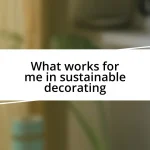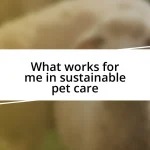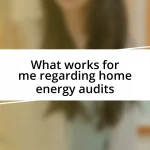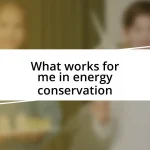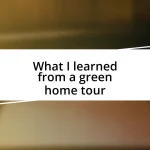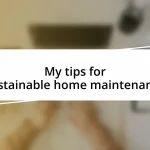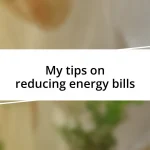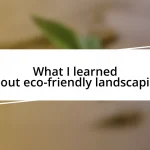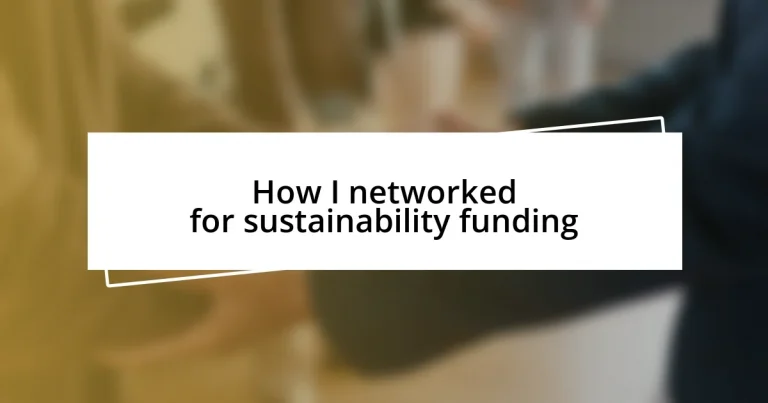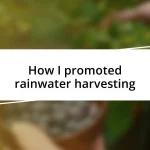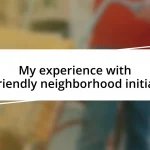Key takeaways:
- Understanding funder goals and tailoring pitches to align with their missions significantly enhances the chances of securing sustainability funding.
- Effective networking requires a mix of relevant events, social media engagement, and building genuine relationships with funders through personalized interactions and thoughtful follow-ups.
- Crafting a compelling pitch involves simplifying the message, focusing on impactful stories, and showing a clear understanding of the audience’s interests and values.
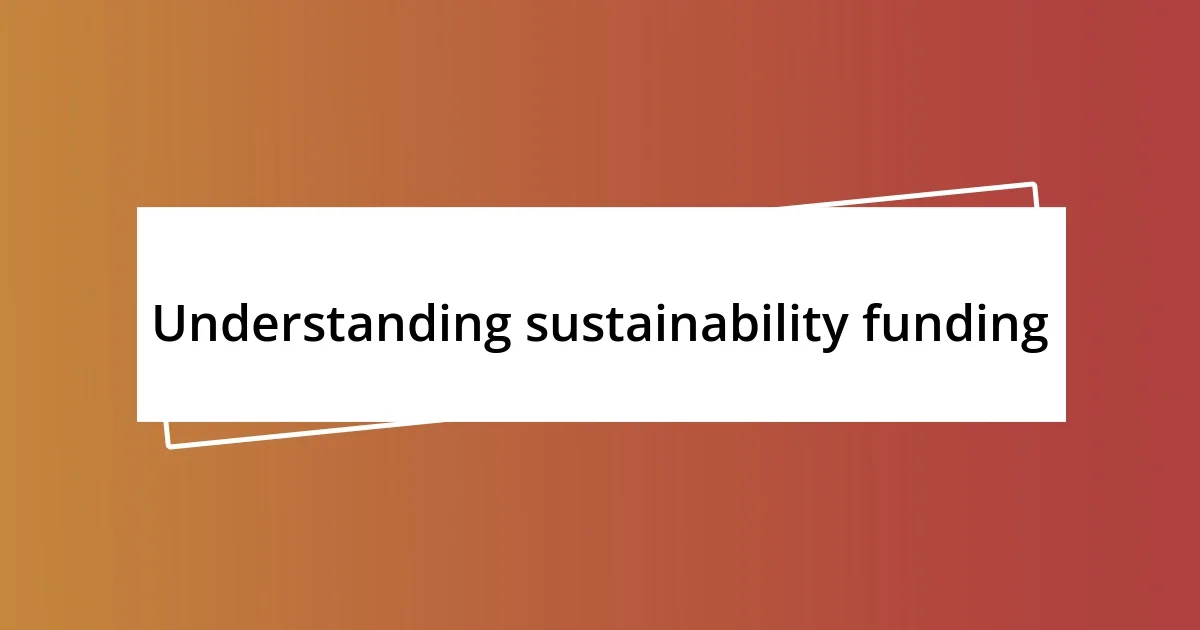
Understanding sustainability funding
Sustainability funding is often characterized by its multifaceted nature, including grants, investments, and donations aimed at supporting eco-friendly initiatives. I remember attending a conference where I learned that finding the right funding source can feel overwhelming. Does anyone else feel that pressure when faced with so many options?
One essential aspect of sustainability funding is understanding the goals of funders, which often align with social impact and environmental stewardship. When I first approached potential funders, I realized that tailoring my pitch to resonate with their mission was crucial. It was enlightening to see how a shared vision could create a powerful connection.
Moreover, the competitive landscape of sustainability funding requires innovative thinking and collaboration. I experienced this firsthand during a networking event where I partnered with another organization. Together, we crafted a proposal that not only highlighted our individual strengths but also demonstrated how our collaboration could lead to a more significant impact—providing funding bodies with a compelling reason to support us. Isn’t it amazing how teamwork can amplify our efforts?
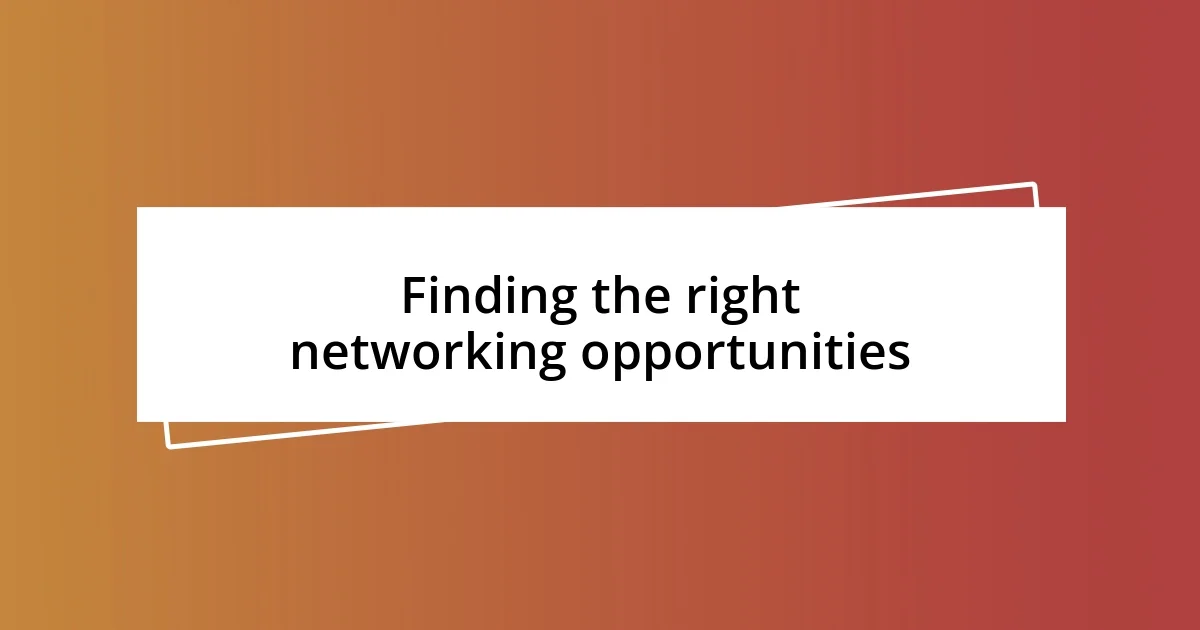
Finding the right networking opportunities
Finding opportunities to network is both an art and a science. During my quest for sustainability funding, I stumbled upon diverse events—some with a dedicated focus on environmental initiatives and others broader in scope. I remember walking into a local sustainability meetup, feeling a mix of excitement and trepidation. The energy in the room was palpable, and that sense of community opened so many doors for me. These informal gatherings can be goldmines for making connections, allowing you to engage with like-minded individuals who may be on similar paths.
When searching for the right networking opportunities, consider these tips:
– Focus on Relevant Events: Look for conferences, workshops, and seminars specifically tailored to sustainability.
– Leverage Social Media: Platforms like LinkedIn and Twitter host groups dedicated to eco-friendly funding.
– Engage in Community Initiatives: Local environmental projects often require passionate volunteers; this is where lasting relationships can form.
– Seek Out Industry Leaders: Attend talks or panels featuring experts in sustainability to expand your network and knowledge.
By approaching networking with intention and openness, you can transform a casual interaction into forging powerful connections that could lead to funding opportunities.
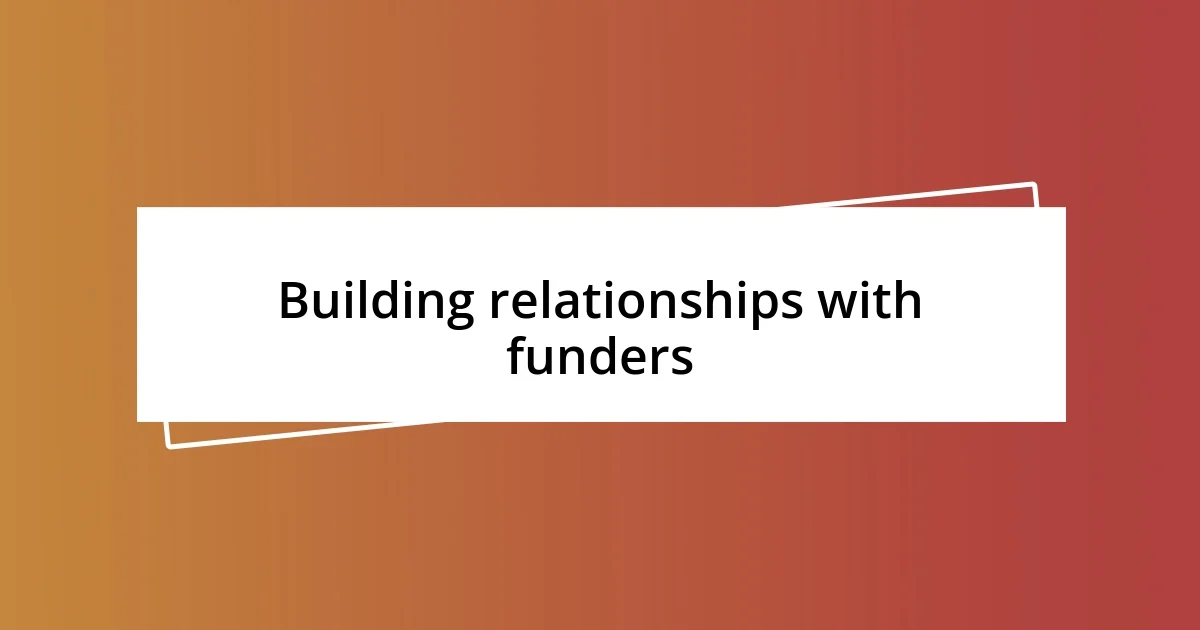
Building relationships with funders
Building relationships with funders is like nurturing any meaningful connection; it requires time, effort, and genuine interest. I recall a moment when I reached out to a potential funder after attending one of their panels. I didn’t merely send a generic email; I shared my insights on their recent projects and explained how my vision aligned with theirs. The response was warm and welcoming, opening up a dialogue that blossomed into a lasting relationship. Isn’t it rewarding when a simple act of engagement leads to something much bigger?
Understanding the intricacies of funder relationships is essential. It’s not purely transactional; it’s an ongoing conversation. In my experience, following up after every interaction is vital. I once sent a handwritten thank-you note after a meeting, which struck a chord with a funder. They appreciated the personal touch, and it set the stage for more meaningful discussions down the line. Honoring each connection this way helps solidify trust, and who doesn’t appreciate a little extra thoughtfulness in our fast-paced world?
As you immerse yourself in the world of sustainability funding, keeping open lines of communication can make all the difference. I’ve often found myself checking in periodically with past funders, sharing progress updates, or simply asking for their thoughts on industry trends. These moments not only keep the relationship alive but can also lead to unexpected opportunities when they recognize your commitment to growth.
| Tip | Explanation |
|---|---|
| Personal Engagement | Reach out with genuine interest and personalize your communication. |
| Follow-Up | Maintain relationships through consistent follow-ups, enhancing trust. |
| Consistency | Regularly update funders about your progress to keep them involved. |
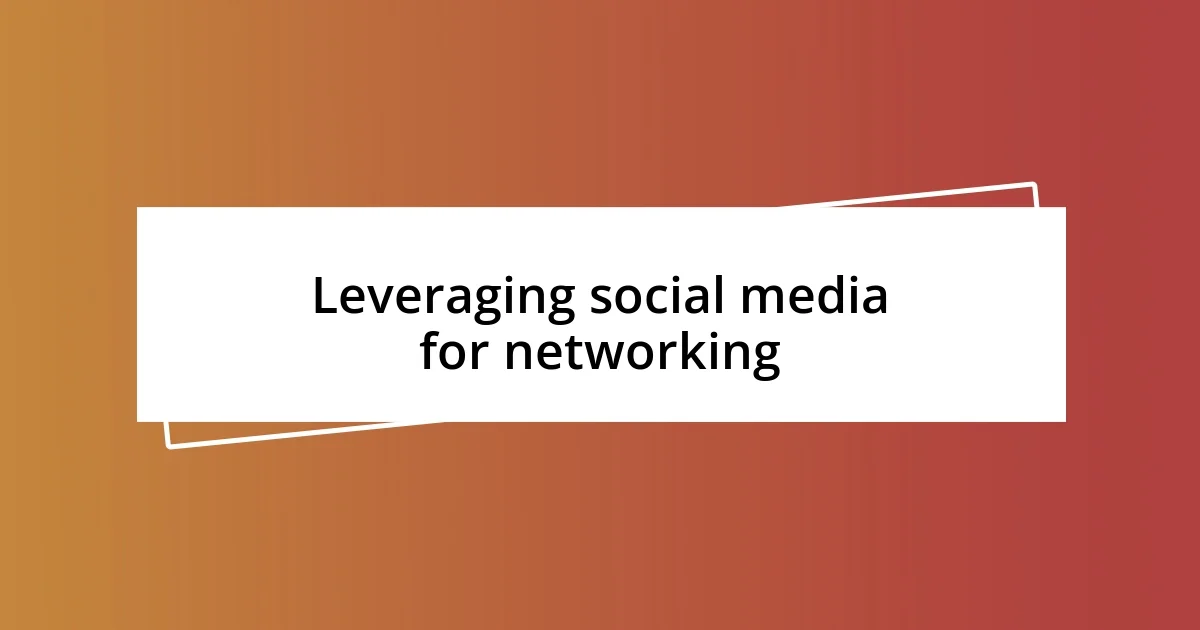
Leveraging social media for networking
When it comes to leveraging social media for networking, I’ve found it to be an invaluable tool. Platforms like LinkedIn have allowed me to connect with influencers and organizations focused on sustainability. I remember my first LinkedIn connection with a sustainability officer from a major corporation. I sent a personalized message mentioning a project of theirs I admired, and it sparked a conversation that led to further discussions about collaborations. Have you ever wondered how a simple online interaction can expand your professional network?
Twitter is another fantastic platform for real-time engagement. I often use it to follow thought leaders and participate in discussions related to sustainability funding. Once, I joined a Twitter chat on renewable energy and ended up engaging with a panelist whose insight I greatly valued. That brief exchange turned into a coffee chat invitation, and it was amazing how a few tweets could lead to such a meaningful connection! Isn’t it fascinating how digital conversations can carry the potential to transform into face-to-face meetings?
Engaging actively in relevant online communities can also amplify your networking efforts. I joined some Facebook groups dedicated to green initiatives, where I shared resources and sought advice. One day, I posted a question about grant opportunities and received a wealth of responses, leading me to discover lesser-known funding sources. These interactions not only broadened my knowledge but also fostered relationships with fellow members. Have you tapped into the power of online communities in your networking journey? The possibilities are truly limitless!
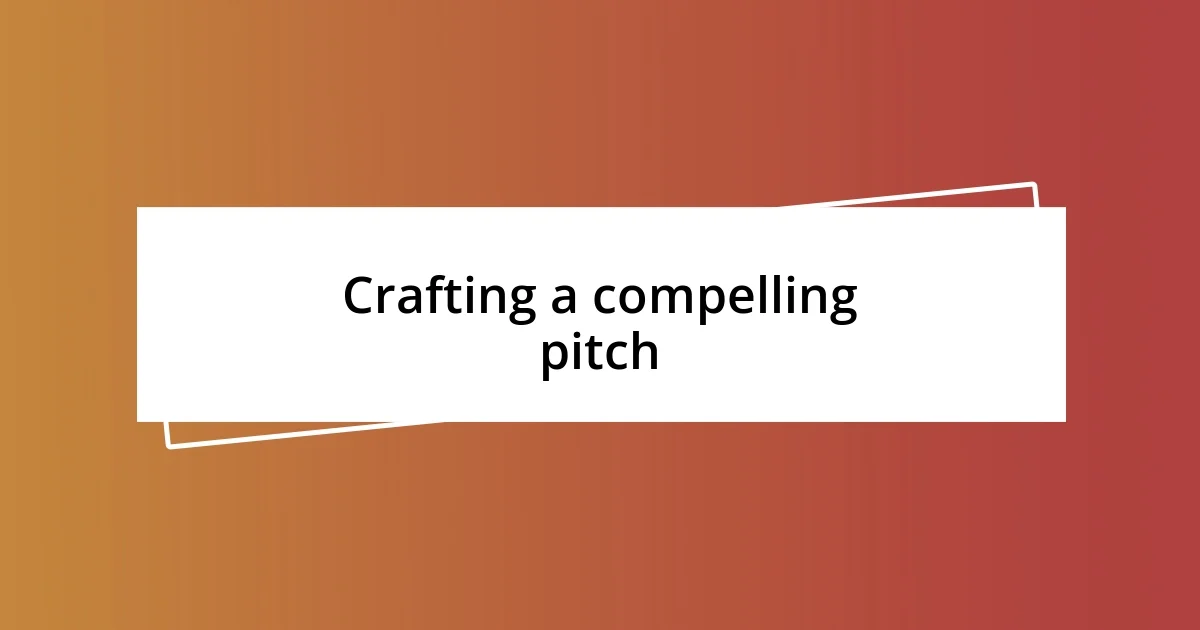
Crafting a compelling pitch
Crafting a compelling pitch is all about clarity and passion. I remember when I had the opportunity to present my sustainability project to a panel of potential funders. Instead of overwhelming them with details, I focused on one key story that illustrated the project’s impact. By weaving in personal narratives, I noticed the funders were not just listening; they were emotionally invested. Isn’t it incredible how a simple story can transform numbers and data into something relatable?
Moreover, understanding your audience is crucial. Before I pitched to a specific funder, I took time to research their priorities and interests. Tailoring my pitch to align with their mission made all the difference. During a pitch meeting, I explicitly connected how my project complemented their goals, which visibly resonated with them. Have you ever tailored your message so precisely that you felt it struck a chord? I truly believe that when you show you understand their vision, you create a stronger bond.
Lastly, I learned the power of brevity. In one of my pitches, I decided to keep it short and focused. Instead of trying to convey everything, I highlighted three core benefits of my initiative. This approach kept their attention and sparked more interactive questions. I couldn’t help but feel relieved when they expressed interest and asked for more details—less can indeed be more. What techniques have you tried to keep your pitch engaging without overwhelming your audience? My experience taught me that simplicity can often lead to captivating conversations.
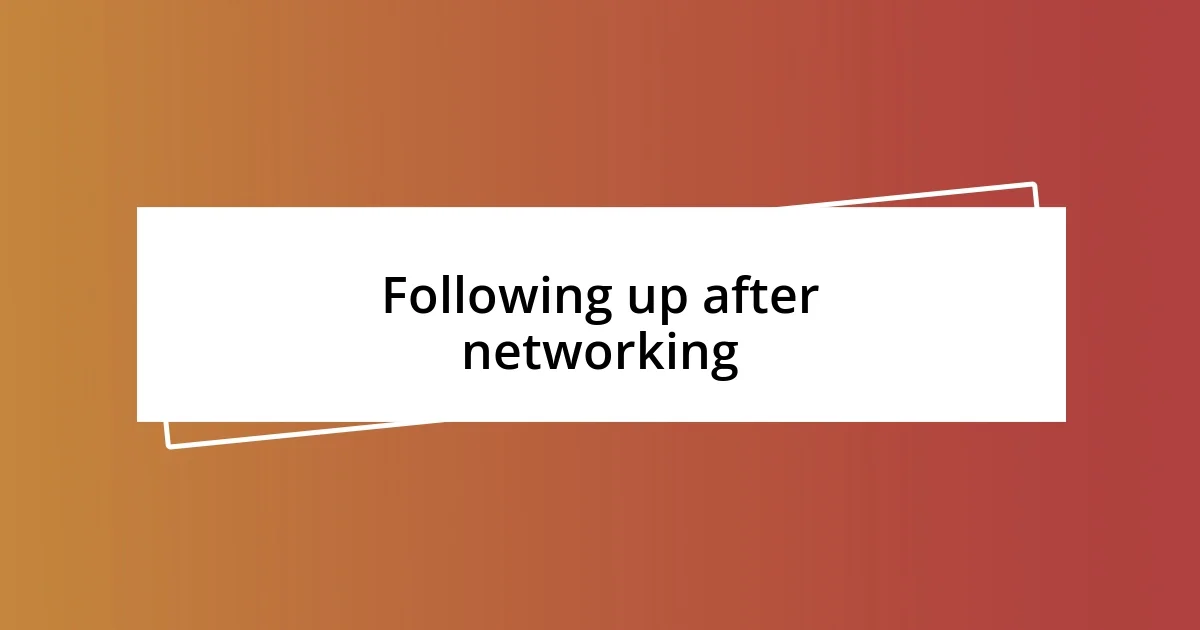
Following up after networking
Following up after networking is a crucial step that I’ve learned not to overlook. After meeting someone interesting, I make it a point to send a thank-you message within 48 hours. It doesn’t have to be long; just a few lines expressing gratitude for their time and insights can solidify your connection. I recall reaching out to a conference speaker a couple of years ago after a riveting presentation. My note highlighted a specific point they made that resonated with me, and wouldn’t you believe it, we ended up exchanging ideas over email for weeks!
Furthermore, I’ve discovered that adding value in my follow-up is key. Instead of just thanking someone, I often share an article or a resource that relates to our conversation. Once, after meeting a fellow attendee at a workshop, I remembered they were interested in social entrepreneurship. I sent them a link to a funding opportunity that complemented their objectives. It not only reinforced our connection but also opened the door for them to reach out again, asking for advice on their application. Isn’t it amazing how a small gesture can cultivate an ongoing conversation?
Lastly, I make sure to keep the lines of communication open. If I sense a potential for future collaboration, I’ll say as much in my follow-up. I vividly remember one conversation where a colleague mentioned needing support for a sustainability initiative. I quickly reached out, expressing my interest in collaborating and suggesting a follow-up coffee chat. This proactive approach led to brainstorming a project that eventually secured funding. How often do you check in with your contacts after networking? Maintaining that ongoing dialogue is pivotal in nurturing relationships and paving the way for future opportunities.

